
Just five weeks after being some of the first in the country to jump on an experimental treatment for desperately ill COVID-19 patients, doctors at Children’s Hospital Colorado are seeing promising results.
Dr. Kyle Annen, medical director of transfusion services and patient blood management at Children’s Hospital, began transfusing plasma from people who have recovered from the novel coronavirus to critically ill patients within days of federal approval of the treatment.
“The FDA had only just approved the ability to use convalescent plasma specifically for COVID-19 under a compassionate use protocol known as an IMD,” Annen said. “From an ethical standpoint, I didn't have any qualms about getting this going.”
The Food and Drug Administration normally goes through rigorous clinical trials before it allows experimental treatments, but makes allowances during what it considers as a “public health emergency.”
The idea is that the antibodies from donors will strengthen ill patients’ immune systems. Annen tells Colorado Matters that the treatment is not 100 percent effective — for example last week, one of the first Colorado convalescent plasma recipients died from COVID-19.
But some results are appear more promising.
“We've heard of some very dramatic responses and we've seen some more slow responses. We do think that this is a very powerful option all for patients,” she said.
Tom Nern, of Edwards, has already donated convalescent plasma twice and plans to do it a third time.
He said the sudden loss of a good friend, 46-year-old Jeremy Davis of Glenwood Springs, to COVID-19 was his motivation for donating.
“He had it at about the same time I did. It’s just a wonderful family. He left his wife and his three kids and, you know, it seemed like the right thing to do.”
Davis died March 27 in the ambulance on the way to the hospital. He and his wife, Delcie, met each other in fifth grade and had been together ever since.
She said her husband’s death was a complete shock to the family.
“He tested positive after coming home with a fever,” said Delcie, “We were told to ride it out. That following Friday he was not getting better so I took my husband in. He said he was really tired. He walked into the hospital on his own with an oxygen level at 30. We had no idea about oxygen levels.” She never saw Jeremy again.
Though Davis never got the chance to get a plasma transfusion, many others have.
Annen said that 140 very sick coronavirus patients in 17 Colorado hospitals have received transfusions. Children’s has collected from 156 donors like Nern, who said the medical professionals at Children’s are easy to work with, “They set you up and give you a nice warm blanket, a little bit of juice, and you're pretty good to go.”
The FDA has strict guidelines for anyone who would like to give plasma. Donors must have a lab-confirmed positive test for the virus and have to be symptom-free for 14 days. Women who have been pregnant are also not eligible because of the confusion with the presence of human leukocyte antigen.
With all of the talk about convalescent plasma, Annen is encouraging people not to forget about giving blood during this time because of a nationwide shortage since the pandemic.
“People were afraid to go to a blood bank for a while there,” said Annen.
Nern is now waiting for his chance to donate plasma a third time, and he said he doesn’t care to know anything about the people he’s helping.
“They're in dire straits and they need help and, uh, you know, you just can't walk by, you gotta bend over and lend a hand. And that's where we, where I think society should be.”








